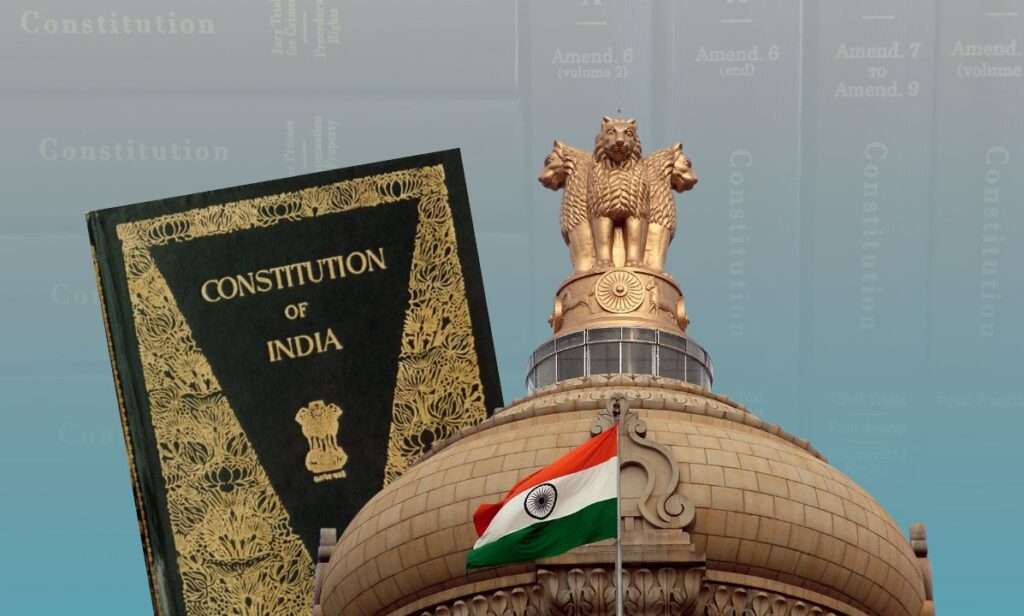
List of Important Articles of Indian Constitution (1-395)
- Indian Constitution is considered as the world’s oldest largest constitution which came into effect on 26th January 1950.
- We all know that Dr. B.R Ambedkar is known as the “founder of the Indian Constitution”.
- The main objective of forming the Constitution is to bringing unity, sovereignty, socialism and peace throughout the country
- When the Constitution was adopted on 26th November 1949, it contained a Preamble, 395 Articles, 18 Parts and 8 Schedules.
- At present, the Indian Constitution is made up of 448 articles, 25 parts & 12 schedules.
- This topic becomes most important for candidates preparing for upcoming SSC Exams and others.
- in this article, we will provide you with the important Parts, Objectives & Articles of the Constitution. total articles in Indian constitution. List of Important Articles of Indian Constitution (1-395)
Latest Current Affairs 2023: Weekly, Monthly Current Affairs (PDF)
List of Important Articles of Indian Constitution (1-395)
| Part | Subject | Article |
| Part I | The Union and Its Territory | Article 1-4 |
| Part II | Citizenship | Article 5-11 |
| Part III | Fundamental Rights | Article 12-35 |
| Part IV | Directive Principles | Article 36-51 |
| Part IV-A | Fundamental Duties | Article 51A |
| Part V | The Union Chapter-1: The Executive Chapter -1: Parliament Chapter-3:Legislative Powers of President Chapter-4:The Union Judiciary Chapter-5: Comptroller & Auditor General | Article 52-151 Article 52- 78 Article 79-122 Article 123 Article 124-147 Article 148-151 |
| Part VI | The States Chapter-1: General Chapter-2: The Executive Chapter-3: The State Legislature Chapter-4: Legislative Powers of Governors Chapter-5: The High Courts Chapter-6: The Subordinate Courts | Article 152-237 Article 152 Article 153-167 Article 168-212 Article 213 Article 214-232 Article 233-237 |
| Part VIII | The Union Territories | Article 239-242 |
| Part IX | The Panchayats | Article 243-243O |
| Part IX-A | The Municipalities | Article 243P-243ZG |
| Part IX-B | The Co-operative Societies | Article 243H-243ZT |
| Part X | The SC’s & ST’s | Article 244-244A |
| Part XI | Relations between Union & States Chapter -1: Legislative Chapter-2: Administrative | Article 245-263 Article 245-255 Article 256-263 |
| Part XII | Finance, Property, Contract Chapter-1:Finance Chapter-2: Borrowing Chapter-3: Property, Contracts, Rights Chapter-4: Right to Property | Article 264-300A Article 264-291 Article 292-293 Article 293-300 Article 300A |
| Part XIII | Trade, Commerce & Intercourse within Indian Territory | Article 301-307 |
| Part XIV | Services under the Union and the States | Article 309-323 |
| Part XIVA | Tribunals | Article 323A-323B |
| Part XV | Election | Article 324-329 |
| Part XVI | Special Provisions for Special Classes | Article 330-342 |
| Part XVII | Official Languages | Article 343-351 |
| Part XVIII | Emergency Provisions | Article 352-360 |
| Part XIX | Miscellaneous | Article 361A-365 |
| Part XX | Amendment of the Constitution | Article 368 |
| Part XXI | Temporary, Transitional and Special Provisions | Article 369-392 |
| Part XXII | Short title, commencement, authoritative text in Hindi and repeals | Article 393-395 |
Part-III: Fundamental Rights (Articles 12 to 35)
- the Fundamental Rights from Article 12 to 35 of the Indian Constitution guarantees some to all the Indian citizens for peace and unity.
- These Fundamental Rights includes “equality before law”, “freedom of speech”, “freedom of religion” that are defined in these Articles.
- These rights apply to all the Indian citizens irrespective of their race, caste or gender or place of birth. It can be categorized into six groups namely:
Article 14-18: Right to Equality
1) Article 14: Equality before Law
2) Article 15 – Prohibition of discrimination on the grounds of religion, race, caste, sex or place of birth
3) Article 16 – Equality of opportunity in matters of public employment.
4) Article 17 – Abolition of the untouchability.
5) Article 18 – Abolition of titles.
Article 19-22: Right to Freedom
1) Article 19: Protection of certain rights regarding freedom of speech etc.
2) Article 20: protection in respect of conviction for offences.
3) Article 21: Protection of life and personal liberty.
4) Article 21A: Right to Education (between 6 to 14 years)
5) Article 22: Protection against arrest and detention in certain cases
Article 23-24: Right Against Exploitation
1) Article 23: Prohibition of Traffic in human and forced labor.
2) Article 24: Protection of employment of children in factories etc.
Article 25-28: Right to Freedom of Religion
1) Article 25 – Freedom of conscience and free profession, practice and Propagation of religion
2) Article 26 – Freedom to manage religious affairs.
3) Article 27 – Freedom as to pay taxes for promotion of any particular Religion
4) Article 28 – Freedom from attending religious instruction.
Article 29-30: Cultural and Educational Rights
1) Article 29: Protection of interests of minorities.
2) Article 30: Right of minorities to establish educational institutions.
Article 31: Saving of Certain Laws
Article 32-35: Right to Constitutional Remedies
1) Article 32: Remedies for enforcement of rights conferred by this part
2) Article 33; Power of parliament to modify the rights conferred by this part In their application of forces etc.
3) Article 34: Restriction on rights conferred by this part while martial law is in force in any area.
4) Article 35: Legislation to give effects to the provisions of this part.
Part IV: Directive Principles of State Policy (Article 36-51)
(Also known as Gandhian Principle)
- The Directive Principles of State Policy (DPSP) are the set of instructions to be followed by the executives and legislatures to show in what manner they are to exercise their power.
- These principle are borrowed from the Directive Principles given in the Constitution of Ireland.
- The objective of these principles is to establish a social and economic democracy in India, making laws to establish peace in the society in the country.
- Directive Principles are classified under the following categories: Economic and Socialistic, Political and Administrative economic welfare,, Justice and Legal, Environmental, Protection of Monuments, Peace and Security.
| Article | Subject |
| Article 39A | Equal Justice and Free Legal Aid |
| Article 40 | Organization of Village Panchayats. |
| Article 41 | Right to Work, to education and public assistance in certain cases. |
| Article 43 | Living wage for workers. |
| Article 43A | Participation of workers in management of industries. |
| Article 43B | Promotion of Co-operative Societies. |
| Article 44 | Uniform civil code for all citizens. |
| Article 45 | To provide early childhood care and education until the age of 6 years. |
| Article 46 | Promotion of education of SC’s and ST’s and other economically weaker section. |
| Article 47 | Prohibition of intoxicating drinks and drugs. |
| Article 48 | To prohibit the slaughter of cows, calves. |
| Article 48A | Protection and improvement of environment for forests and wildlife. |
| Article 49 | Protection of monuments and places of national importance. |
| Article 50 | Separation of judiciary from executive. |
| Article 51 | Promotion of peace and security. |
Some Other Important Articles
| Article | Subject |
| Article 52 | The President of India |
| Article 54 | Election of President |
| Article 61 | Impeachment of President |
| Article 63 | The Vice President of India |
| Article 74 | Prime Minister is the head of council of ministers |
| Article 80 | Composition of the council of states (Rajya Sabha) |
| Article 81 | Composition of the council of people (Lok Sabha) |
| Article 110 | Definition of Money Bills |
| Article 112 | Annual financial statement |
| Article 127 | Appointment of ad hoc judges |
| Article 153 | Governors of states |
| Article 157 | Qualification for appointment as governor |
| Article 161 | Pardoning powers of governor |
| Article 226 | High Court to issue a writ |
| Article 246A | State and Union to make or amend relating to GST laws |
| Article 279A | Powers to President to constitute GST Council. |
| Article 280 | Finance Commission |
| Article 343 | Hindi as an official language of the union |

Heya! I know this is kind of off-topic but I needed to ask.
Does managing a well-established blog such as yours require a large amount of
work? I am completely new to writing a blog but
I do write in my journal every day. I’d like to start a blog so I can share my personal experience and feelings online.
Please let me know if you have any suggestions or tips for brand new aspiring blog owners.
Appreciate it!
Your method of describing all in this post is actually fastidious, every one be able to effortlessly understand it, Thanks a lot.